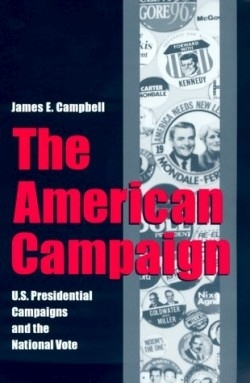The American Campaign
U.S. Presidential Campaigns and the National Vote
Political pundits frequently attribute an election loss or victory to a “regrettable gaffe, the brilliant maneuver, the key endorsement or the bungled strategic move.” Although images of Reagan’s “there-you-go-again” put down of President Carter, President Ford declaring that there is no Soviet domination of Eastern Europe and Richard Nixon’s “secret plan” for winning the Vietnam War are strongly associated with the winners and losers of the elections of 1980, 1976 and 1968, Campbell, professor of political science at State University of New York at Buffalo, spent ten years researching presidential campaigns to dispute the over importance attached to what he terms these unsystematic campaign effects.
The author, through his “Theory of the Predicable Campaign,” demonstrates his contention that political science is not just concerned with explaining elections but also predicting their outcomes. According to his theory, presidential campaigns are constrained by the widespread partisanship of the electorate: approximately eighty-five percent of the electorate is Republican or Democrat. Political parties are stronger and voters are less independent than perceived. Campaign effects are variables that can be historically quantified and used as predictors of elections. The ones he identifies are the narrowing gap between the leading candidate and his challengers, the state of the election year economy and the advantage of incumbency, which provides little advantage to a candidate whose party has been in office for two consecutive terms.
Systematic campaign effects, notes Campbell, only produce an average of a four percent shift in the total vote. Actually, from 1960-1980 incumbency was viewed more as a liability: Ford (1976) and Carter (1980) were defeated, Johnson (1968) chose not to run for a second term and Nixon (1972) was forced to resign in 1974. From 1868 through 1996, however, incumbents have won in fourteen of twenty-one elections.
Americans, rightly or wrongly, hold presidents responsible for the state of the economy. This systematic campaign effect works to the incumbent’s advantage when economic conditions are favorable, but as Jimmy Carter learned in 1980, can be the leading contributor to a loss during a recession. The narrowing of the frontrunner’s lead, the most predictable campaign effect, has been positively demonstrated in twelve of the last thirteen elections.
Campbell reveals, in this rigorous analysis of voting behavior aimed at political scientists and advanced students, that although the impacts of campaign effects are limited, they have been decisive in one of every five to six elections. Candidates that account for the narrowing of the frontrunner’s lead, the election year economy and incumbency can more effectively plan their campaign strategies. Campaigns, over all, are limited in influence and predictable, but important because they stimulate voter interest and encourage candidate responsiveness.
Reviewed by
Karl Helicher
Disclosure: This article is not an endorsement, but a review. The publisher of this book provided free copies of the book to have their book reviewed by a professional reviewer. No fee was paid by the publisher for this review. Foreword Reviews only recommends books that we love. Foreword Magazine, Inc. is disclosing this in accordance with the Federal Trade Commission’s 16 CFR, Part 255.

